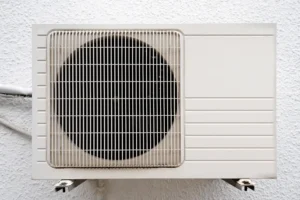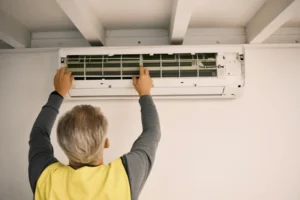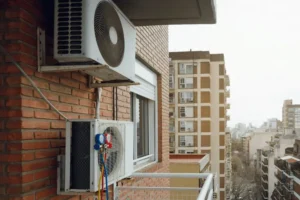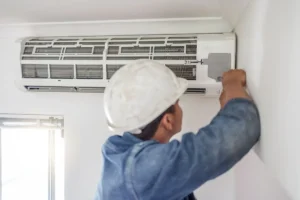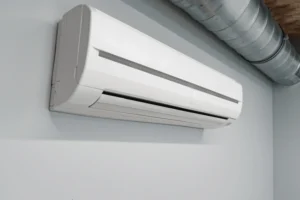Installing a heat pump is a smart move for homeowners looking to cut energy costs, reduce carbon emissions, and enjoy year-round comfort. But before making the investment, it’s essential to understand the factors that will influence your system’s performance, efficiency, and return on investment.
From climate suitability to installation costs, every home has unique requirements. Making an informed decision will ensure you get the most from your heat pump for the next 15-20 years.
In Ottawa, where winters can reach -30°C and summers are warm and humid, selecting the right cold-climate heat pump can make the difference between year-round comfort and seasonal frustration.
1. Climate and Temperature Range
Heat pump efficiency depends heavily on outdoor temperatures. In regions with mild winters, standard models may be sufficient. However, in cold climates, a cold-climate heat pump rated for -25°C or lower is essential.
Example: The Mitsubishi Zuba Central and Daikin Aurora retain up to 80-100% of their heating capacity at -15°C, making them strong choices for Ottawa homeowners.
2. Correct Sizing
A heat pump that’s too small will struggle to heat your home, while an oversized unit will short-cycle, wasting energy. A Manual J load calculation ensures proper sizing based on square footage, insulation, and climate.
In Ottawa, proper sizing is especially important because extended cold periods put higher demands on heating systems.
3. Energy Efficiency Ratings
Check for:
- HSPF2 ≥ 8.5 for heating efficiency.
- SEER2 ≥ 17 for cooling efficiency.
- ENERGY STAR® certification for independent performance validation.
Higher ratings mean lower long-term operating costs and reduced environmental impact.
4. Installation Quality
Even the best heat pump will underperform if poorly installed. Choose a licensed, experienced HVAC contractor familiar with Ottawa’s climate and local rebate programs.
A professional will ensure proper refrigerant charging, ductwork adjustments, and integration with backup heating.
5. Upfront and Operating Costs
Installation costs vary from $8,000 to $15,000, depending on system type, ductwork needs, and efficiency.
Ottawa cost example:
- Cold-climate ductless mini-split: $8,000-$12,000
- Cold-climate ducted system: $12,000-$15,000
Operating costs for a heat pump in Ottawa are typically 20-40% lower than oil heating and can be competitive with natural gas, especially with rebates.
Graph: Heat Pump Installation Costs in Ottawa
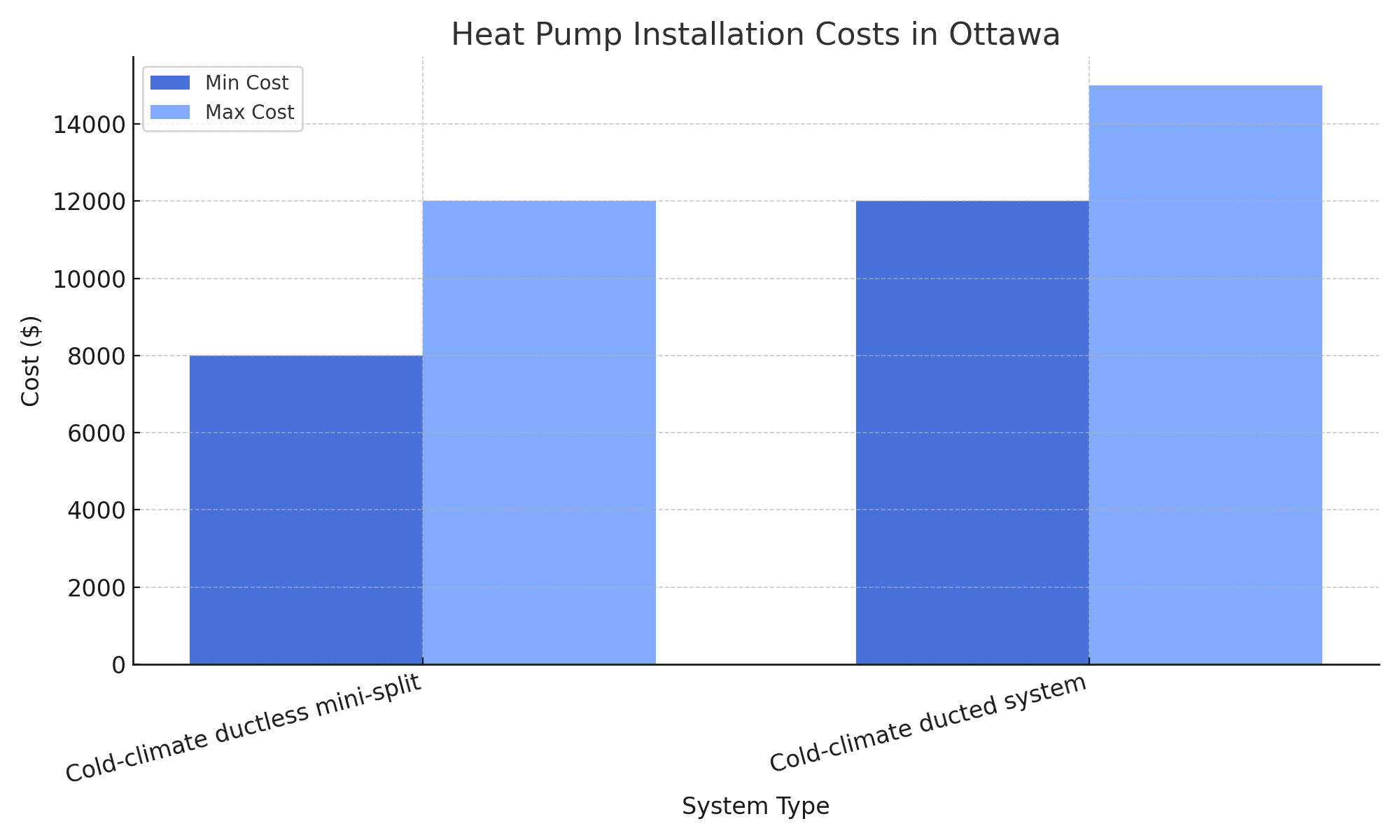
6. Available Rebates and Incentives
Look into national, provincial/state, and utility rebates. In Canada, programs like the Canada Greener Homes Grant and Enbridge HER+ can offer thousands in savings.
Ottawa homeowners can access:
- Canada Greener Homes Grant: up to $5,000
- Enbridge Home Efficiency Rebate Plus: up to $7,500
- Oil to Heat Pump Affordability Program: up to $15,000 for eligible households
Combining these incentives can reduce upfront costs by 30–50%.
Graph: Heat Pump Rebates Available in Ottawa
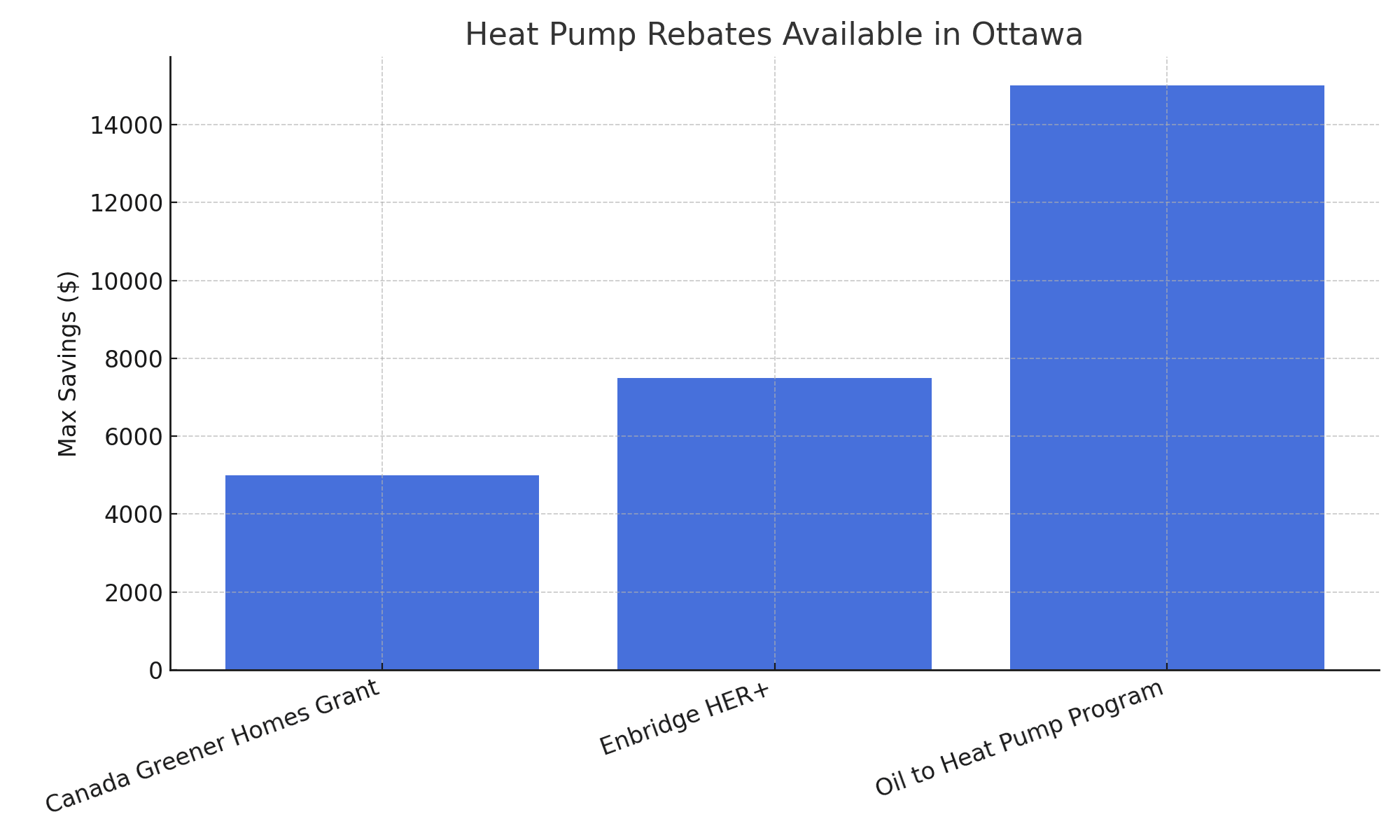
7. Backup Heating Options
In very cold climates, supplemental heat is often recommended. This could be:
- Electric resistance heating: simple, lower upfront cost.
- Gas furnace hybrid system: higher upfront cost, best efficiency in extreme cold.
Key Factors Comparison Table
| Factor | Why It Matters | Recommended Choice for Cold Climates |
| Climate | Determines model suitability | Cold-climate rated to –25°C or lower |
| Sizing | Impacts efficiency and comfort | Manual J load calculation |
| Efficiency Ratings | Affects long-term operating costs | HSPF2 ≥ 8.5, SEER2 ≥ 17 |
| Installation Quality | Ensures performance and reliability | Licensed HVAC contractor |
| Backup Heating | Maintains comfort in extreme cold | Hybrid or dual-fuel system |
Ottawa-Specific Tip
If you live in an older Ottawa home with minimal insulation, investing in insulation upgrades before installing a heat pump can greatly improve efficiency and comfort while allowing for a smaller, less costly system.
Future-Proofing Your Heat Pump Investment
When installing a heat pump, think beyond today’s needs. Ottawa’s building codes and energy standards are evolving, and choosing a higher-efficiency unit now can protect you from future regulatory changes and rising energy costs.
Consider smart controls and zoning capabilities to fine-tune comfort room-by-room, especially in larger homes. Integrating your heat pump with a smart thermostat allows you to optimize heating schedules, track energy usage, and adjust settings remotely.
It is also wise to assess your home’s electrical capacity. Some high-performance cold-climate heat pumps require panel upgrades, which can be easier and less expensive to complete during initial installation rather than later.
By planning ahead, you’ll ensure your heat pump meets your comfort needs today while staying adaptable for the next 15-20 years of Ottawa’s climate and technology advancements.
Frequently Asked Questions
- Does my climate affect heat pump performance?
Yes. Cold-climate models are essential for reliable operation in winter temperatures below -20°C, ensuring comfort and efficiency even during deep freezes. - How important is correct heat pump sizing?
Very. Undersized units overwork, increasing bills, while oversized ones short-cycle, wasting energy and reducing lifespan. - Are there rebates for heat pumps?
Yes. Many regions offer $2,500-$7,500 or more for installing efficient cold-climate heat pumps. - Can a heat pump replace both heating and cooling systems?
Yes. One system can handle both, replacing your furnace and central AC. - Do I still need a backup heat source?
In very cold areas, a backup system ensures comfort and prevents overloading the heat pump. - How long does installation take?
Most heat pump installations take 1-3 days, depending on complexity and ductwork needs. - How long will my heat pump last?
With regular servicing, 15-20 years is typical. - Will a heat pump increase my electricity bill?
Yes, but overall heating costs usually drop compared to oil or electric baseboards. - Can I install a heat pump myself?
No. Professional installation is needed for efficiency, safety, and warranty coverage. - Do heat pumps work in older homes?
Yes, but ductless models may be better for houses without existing ductwork.
Conclusion
A heat pump can transform your home’s comfort and efficiency, but choosing the right system means considering climate, sizing, efficiency ratings, installation quality, and potential rebates. Informed decisions lead to better performance, lower costs, and longer system life.
If you’re ready to upgrade, partner with a qualified HVAC professional who can assess your home’s needs and recommend the best solution. A well-chosen heat pump will deliver comfort and savings for many years to come.
Contact details
Heat Pump Ottawa Pros
Address: 150 Elgin St, Suite 807, Ottawa, ON K2P 1L4
Phone Number: 613-706-0838
Email: heatpumpottawapros@gmail.com
Office Hours
Monday – Sunday: 9:00 AM – 5:00 PM

